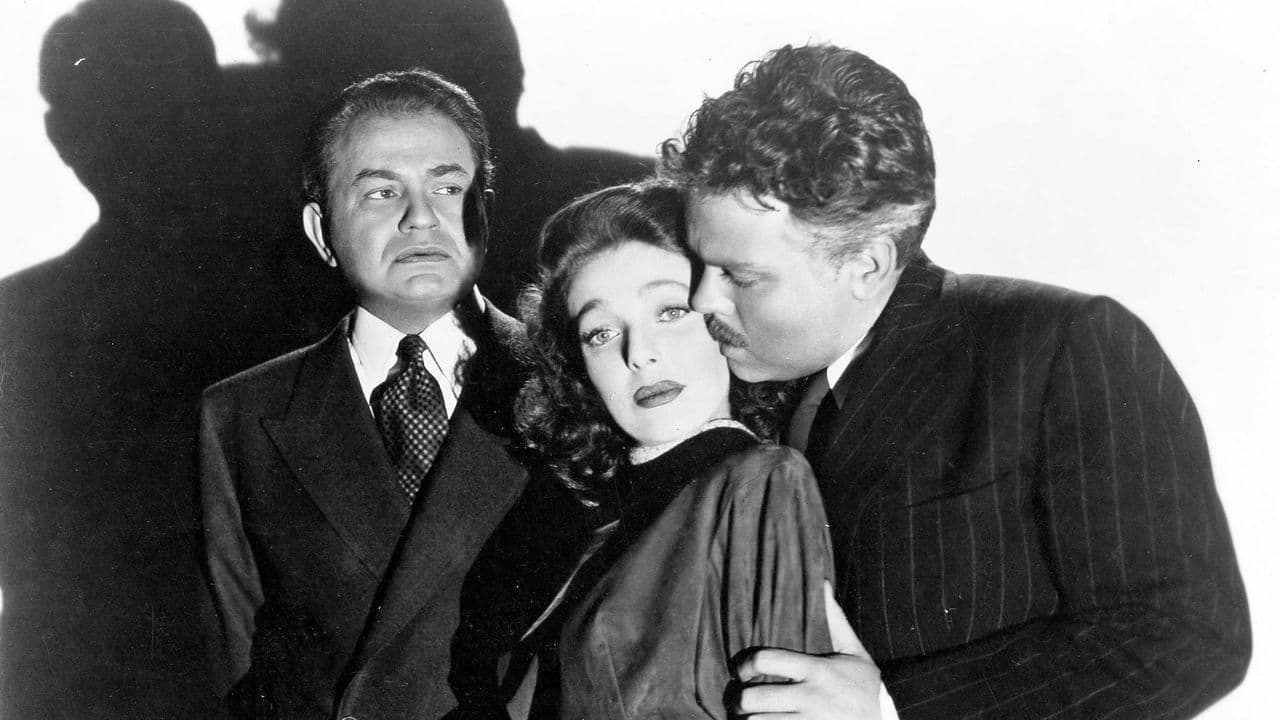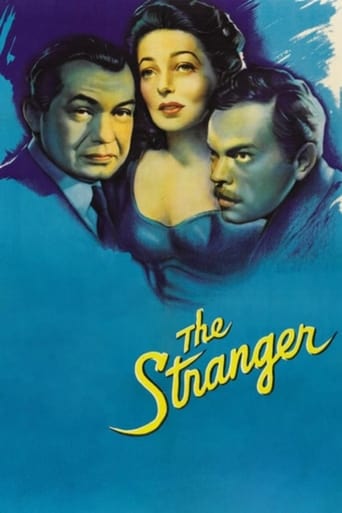

The film makes a home in your brain and the only cure is to see it again.
... View MoreThis is a coming of age storyline that you've seen in one form or another for decades. It takes a truly unique voice to make yet another one worth watching.
... View MoreOne of the best movies of the year! Incredible from the beginning to the end.
... View MoreThere's a more than satisfactory amount of boom-boom in the movie's trim running time.
... View MoreThough not Orson Welles' most famous piece, it's important to note that when The Stranger made its debut, it was his highest-grossing film to date. The Stranger deserves more recognition and attention than it gets, overshadowed often. A wonderful blend of human emotion, drama and mystery. A town full of genuinely kind and unassuming people is a deliciously dreadful backdrop to serve as a foil for the true evil that is Franz Kindler. Loretta Young and Welles each display their respective prowess; Young with her talent for drama and emotion shining through and Welles does well playing a snake who tries to deceive everyone, maybe even himself too. A great film and one that any self-respecting Welles fan needs to watch!
... View MoreThis film may have the questionable label as the weakest in Welles' canon, but The Stranger is particularly significant in the development of post-war film noir.Posing as a teacher at a boys' school in Harper, Connecticut, a Nazi war criminal-in-hiding (Orson Welles), about to marry the daughter of good family (Loretta Young), discovers the presence of an FBI agent (Edward G. Robinson) sent by the government to track him down.The cat-and-mouse game that ensues arguably does veer into the preposterous; it is over-emoted, full of curious improbabilities and implausible coincidences. But in its own peculiar way, the film compels.Earlier in the decade, Thornton Wilder's Our Town set the prototype of small-town America, but film noir brings out an alternative view, notably in Shadow of a Doubt, Out of the Past, The Killers and the noir underbelly of It's A Wonderful Life. The cycle of films expresses the national anxiety following World War II as threatening crime intrudes into America's safe places. Loretta Young here represents the complacent American suddenly traumatized by the inconceivable. This is part of Welles' point. Harper assumes itself to have nothing to be afraid of. But in the circumstances, the small town turns perverse, full of harsh lighting effects, odd camera angles, grotesque faces, murderous events stretched to the limits of plausibility - all achieved through Welles' preference for the angular and distorted, harsh lighting and layered compositions. Harper eventually closes in on the Nazi war criminal Franz Kindler; the radius gets narrower and narrower, the world shrinks finally to the space inside the church bell tower, trapping 'the stranger' in the deadly mechanism of a medieval clock.The clock, operating randomly, with medieval figures that move and (when needed) pierce sharply with their spears, is a sign that time itself is out of joint. Appropriately, Kindler the Nazi is fatally wounded by clock figures that, as he has himself explained earlier, derive from Teutonic mythology. Thus, figures from the historical past destroy the modern abomination.The most lucrative for Welles of all his films, The Stranger had good box office. It moves quickly, and there is always an unexpected situation coming up, and we keep wondering about that clock in the church square.The use of concentration camp newsreel and the release of the film during the Nuremberg trials make it contemporary and relevant to the post-war era.
... View MoreBefore watching this I did some research and learned this was a more mainstream and traditional attempt at movie making by Welles, however I can still pick up all his signature techniques and styles and thought it helped make this classic noire film shine and really be a hidden gem. Unique camera angles and clever lighting. Welles possess this larger than life screen presence that we have grown accustomed to, even when his film threatens to lose credibility, by becoming too extreme or unbelievable, the dialogue or plot becoming almost too extreme or unrealistic, his masterful acting and directorial grasp keep it steady and the audience glued to the screen making it still very believable story Great cinematography, the use of shadows really makes this thriller better than the average classic. What really is signature Welles is the tension and thrilling of a story it is. You know what the good guy and the bad guy are planning, but you don't know who's going to act first, or who's going to get hurt when they do. At any moment you are waiting for a confrontation and after every tense scene you figure it is time where true identities will be revealed. The ending was suiting to, I thought to get impaled by a sword on a clock tower and to fall to his death was a suitable death for the Nazi
... View MoreOrson Welles' The Stranger is a crime film that tells the story of an ex-Nazi on the run and the federal agent who is after him. The plot here is simple enough, but the writing is very good which allows it to rise above similar movies. There's a mystery element to it, but it's handled in a way where the audience knows who the agent is after. It's a solid film with great acting (even from minor characters) and it has that Welles charm. The character interactions feel genuine, and honestly the film is just pleasant (despite the dark plot points). There's just something about it that feels right. I do have some minor complaints however. Continuity is shaky sometimes as the film transitions from one shot to another. The part that bugged me the most was when the agent character, Mr. Wilson is speaking to a store clerk while playing checkers. Whenever the camera is facing the clerk, his right hand is on the table. When the camera is on Mr. Wilson, the clerk's left hand is on the table. Normally something tiny like that wouldn't bother me, but they go back and forth so frequently it's hard not to notice. There were other minor things as well, such as doors or things in the background not perfectly lining up, but nothing was to the same degree as the clerk scene and they were more or less passable. The other thing that irked me was plot related. About halfway through the movie, Mr. Wilson is showing Mary Longstreet, the ex-Nazi's wife, footage of death camps from the holocaust and is trying to convince her to help him catch her husband. He then explains different things from the footage, and begins to credit her husband for their existence. He specifically states that her husband was the one to "conceive the theory of genocide." Now even though this is a piece of fiction, that's the one thing in the entire film that feels like a stretch. Everything else they say seems reasonable, and the husband even does some terrible things (such as strangling a man and poisoning a dog), but that jump just didn't click with me. Initially he was just a Nazi on the run, and now all of a sudden he's Hitler's right hand man. It doesn't ruin the movie, but it feels off. I think it was more for the audience than the wife, because even while the husband does terrible things on screen, you still kind of root for him and want him to get away with everything. So maybe making him higher up on the Nazi rank was their way to justify his eventual death at the end. Regardless of their reasoning, the film still stands on its own, even with a skeptic like me.
... View More